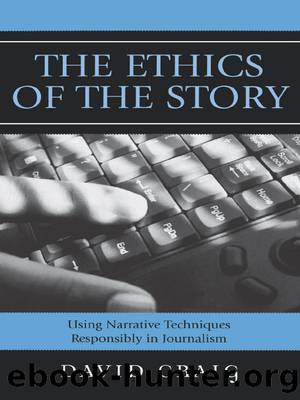The Ethics of the Story by Craig David;

Author:Craig, David;
Language: eng
Format: epub
ISBN: 1351065
Publisher: Rowman & Littlefield Publishers, Incorporated
Published: 2013-06-25T00:00:00+00:00
One of the most significant areas for ethical choice in quote editing is when, if ever, to change grammar. Minor changes in grammar may not materially alter the meaning of a sentence, but even peopleâs grammar says something about who they areâso choices about grammar raise issues about truth telling. They even connect with compassion because, particularly for people who are not used to being in the news or are poorly educated, communicating their grammar in a literal way can cause embarrassment.
Frank Smith, the deputy copy desk chief on the news copy desk at the Morning News, said the paper handles choices about grammar in quotes case by case, taking into account the writerâs perspective and the views of editors. âIf itâs someone in power who misspeaks and itâs an important issue, I think youâre more likely to see then this statement in quotes,â he said.79 Melissa McCoy, assistant managing editor for copy desks at the Times and later deputy managing editor, said the paper has faced choices about how to handle quotes from a prominent official, President Bush, who has himself acknowledged that he does not always speak cleanly and articulatelyâand in fact has laughed at his own stumbles. Since the main goal of the newspaper is to communicate clearly with readers, paraphrasing may helpâbut McCoy said editors would not edit inarticulate quotes and leave them in quotation marks.80
When the speaker is not in a position of power or in the media spotlight, more ethical sensitivity is needed on how to render quotes. McCoy cited the example of a PTA meeting where parents may be present to represent their childrenâs interests but may not be very articulate: âI think what I would do is simply not use a lot of quoted matter from those people. I would paraphrase what they said because itâs the information thatâs important, not the way they said it. But thatâs an ethical issue.â81 Some journalists would probably make minor grammatical changes in that case, but the choice to paraphrase better preserves truthfulness while showing compassion for the people.
In some stories about ordinary people, the importance of preserving the distinctiveness of communication style or dialect calls for quoting, not paraphrasing, and leaving the grammar alone. âClearly,â McCoy said, âwhen itâs a personality profile or itâs a story with flavor about a neighborhood or something, if you didnât write it the way they said it, it would look as if you hadnât been there.â82 Kurt Streeter of the Times showed he had been there in a profile of Arthur Winston, a ninety-seven-year-old man who had worked for seventy years cleaning vehicles for the Los Angeles transit agencyâwith one dayâs absence. He opened the story this way (quotes in italics):
Strong and sharp and bearing down on 100 years of living, Arthur Winston has drawn a bead on what it takes to age well.
Cut up the credit cards.
They donât do nothing more than bring about worry. Worry will kill you.
Get off the couch.
Stop in one place too long, you freeze up.
Download
This site does not store any files on its server. We only index and link to content provided by other sites. Please contact the content providers to delete copyright contents if any and email us, we'll remove relevant links or contents immediately.
| Publishing & Books | Research |
| Writing |
Autoboyography by Christina Lauren(4685)
Asking the Right Questions: A Guide to Critical Thinking by M. Neil Browne & Stuart M. Keeley(4603)
Dialogue by Robert McKee(3594)
Eat That Frog! by Brian Tracy(3529)
Sticky Fingers by Joe Hagan(3459)
Journeys Out of the Body by Robert Monroe(3000)
Elements of Style 2017 by Richard De A'Morelli(2947)
Annapurna by Maurice Herzog(2850)
Schaum's Quick Guide to Writing Great Short Stories by Margaret Lucke(2812)
Full Circle by Michael Palin(2784)
The Diviners by Libba Bray(2449)
The Art of Dramatic Writing: Its Basis in the Creative Interpretation of Human Motives by Egri Lajos(2419)
The Mental Game of Writing: How to Overcome Obstacles, Stay Creative and Productive, and Free Your Mind for Success by James Scott Bell(2401)
Why I Write by George Orwell(2367)
Atlas Obscura by Joshua Foer(2354)
In Patagonia by Bruce Chatwin(2280)
The Fight by Norman Mailer(2162)
The Elements of Style by William Strunk and E. B. White(2078)
Venice by Jan Morris(2056)
